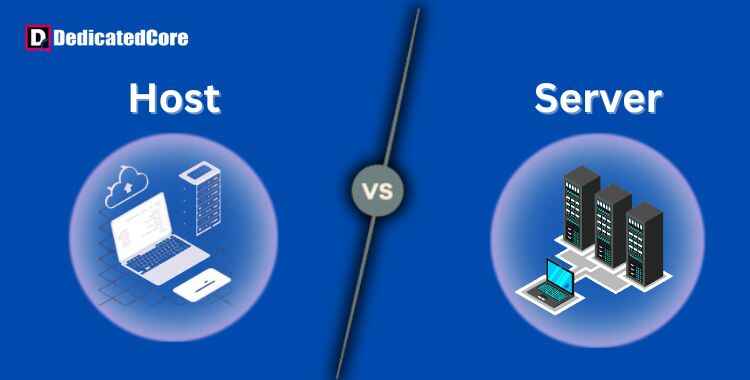Hosts and servers within IT infrastructure and computer networks have separate but related functions. Any device connected to a network is referred to as a host, but a server is a specialized entity created to offer particular services or resources to other devices connected to that network. Comprehending the distinctions between hosts and servers is essential to grasping the workings of network communication and the features that each adds to the system as a whole. For businesses, that are looking to enhance their online presence with robust hosting, discover affordable options for a high-performance dedicated server in the United States (USA).
A host is a connected device in a network, but a server offers services to other applications and devices in the network. This is the primary distinction between a host and a server. The resources that servers supply for the network are used by hosts. For a network to function well, it needs both of them. To connect to a network, hosts require an internet connection, but servers can operate in a local area network (LAN) and the internet. Exploring the virtual private server hosting tailored for forex trading in India can significantly improve the execution and stability, of those involved in currency trading.
Host Vs Server: Uncovering Major Differences
Server
- A computer, software, or other device that uses a network to send data, resources, or services to other programs or devices (referred to as clients).
- Either real or virtual machines are possible.
- A particular kind of host that is intended to manage and reply to queries from other networked devices.
- Operates with the exclusive goal of helping customers or users.
- Every server can host.
- They are made to accommodate several users or clients at once.
- It never shuts down and is always available online, providing people who ask for its services with ongoing support.
- Usually devoted to performing particular tasks, including managing email, storing data, hosting websites, or executing apps.
- The computer software that offers networked device services
- Gives hosts access to resources and services
- Email servers, file servers, database servers, application servers, and web servers
Host
- A device or computer that is part of a network that may connect to and communicate with other devices or computers.
- It can refer to customers, servers, or both.
- It can be in many different forms, such as a laptop, smartphone, or personal computer.
- Acts as a network connector, providing resources and services to other devices.
- Every host is not a server.
- More like an end-user gadget, where users engage with data and apps directly.
- Serves as a hub for the management, access, and storage of data.
- DefiAn apparatus linked to a network
- RolRequests resources from servers and uses them.
- ExaPersonal computers, tablets, laptops, and cellphones
FAQ: Distinguishing Between Host and Server
Q1. First off, what is a Web Host?
A web host is a network-connected device that facilitates communication with other devices on the same network.
Q2: Define a Server.
A server is a specialized computer or piece of software that gives other computers connected to a network resources or services. Servers are made to perform specific functions, such as hosting websites, controlling network traffic, and storing data.
Q3: Is a Host always a Server?
No, not all hosts function as servers. Not every host is a server, even though every server is a host. One particular kind of host in a network that offers services to other hosts is called a server.
Q4: What kinds of things are Servers?
File servers, web servers, database servers, and more are just a few of the many uses for servers. Examples of web servers are Nginx or Apache, database servers are MySQL or PostgreSQL, and email servers are Microsoft Exchange.
Wrapping Up with Difference between Hosts and Servers
Within the complex environment of networked systems, hosts are the various types of devices that make requests, while servers are the committed entities that work hard to provide certain services. The foundation of effective network operations is the symbiotic relationship between hosts and servers, which emphasizes the interaction between end-user devices and reliable, task-oriented servers.
The functions of hosts and servers are changing along with technology, which emphasizes how essential they are to the smooth operation of today’s networked settings.

